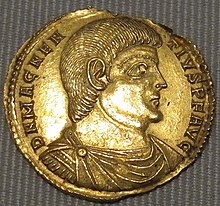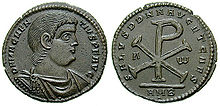Magnentius


Flavius Magnus Magnentius (* around 303 in Ambianum ? † August 10, 353 in Lugdunum ) was Roman counter-emperor from 350 to 353.
Magnentius was probably partly of Germanic descent; his father seems to have been Romanized British, but his mother was a Franconian . However, he was considered a Roman, otherwise he would not have come into question as emperor. Under Constantine I he rose in the army and became - perhaps already under Constantine's sons - first protector and then comes rei militaris .
Dissatisfaction in the officer ranks of the Roman army with Emperor Constans culminated in the elevation of Magnentius to emperor on January 18, 350 at a banquet in Augustodunum ( Autun ), which was largely promoted by Marcellinus , Constans' treasurer. Constans was hunting when he found out. But he was then dropped by almost everyone and a short time later slain by a squad of light cavalry near the Pyrenees .
Magnentius quickly gained the support of the provinces of Britain , Gaul , Italy and Africa. Zonaras knows about gifts of money to secure his rule in the provinces. In his policy of rule he showed tolerance towards the different varieties of Christianity and made efforts to establish contact with Athanasius and his followers, probably to secure his rule and to stir up resistance against the remaining Constantinian emperor Constantius II (Constans' brother). Magnentius himself was probably not a Christian and perhaps promoted the survival of pagan cults. This is indicated by the remarks by Philostorgius about Magnentius in his treatises on church history. The Codex Theodosianus testifies that Magnetius again allowed forbidden night sacrifices, consecrated to the polytheistic pantheon , in his domain under his predecessor Constans .
Resistance against Magnentius formed in the Illyricum , where Vetranio proclaimed himself Augustus , and in Italy , where Magnentius had to suppress the usurpation of Nepotianus supported by the Senate . His brother Decentius he rose to Caesar .
Constantius II broke off his campaign against Persia and marched west, where Vetranio surrendered without a fight. In the battle of Mursa (now Osijek ) in 351 he met the enemy. Magnentius led his troops into battle, while Constantius II spent the day praying in a nearby church, leaving command to his generals. The bitter skirmish was one of the bloodiest in all of antiquity, claiming tens of thousands of lives on both sides. Eventually the usurper's outnumbered troops were defeated and forced to retreat to Gaul.
As a result of Magnentius' defeat, the Italian garrisons swung on a loyalist course and submitted to Constantius. Nevertheless Magnentius made another attempt to provide organized resistance, but was in the 353 Battle of Mons Seleucus beaten again, and he suicide committed. His widow Justina married Valentinian I around 370 .
literature
Overview representations
- Wilhelm Enßlin : Magnentius. In: Paulys Realencyclopadie der classischen Antiquity Science (RE). Volume XIV, 1, Stuttgart 1928, column 445 ff.
- Arnold Hugh Martin Jones , John Robert Martindale, John Morris : Fl. Magnus Magnentius. In: The Prosopography of the Later Roman Empire (PLRE). Volume 1, Cambridge University Press, Cambridge 1971, ISBN 0-521-07233-6 , p. 532.
- Sebastian Ristow : Magnentius. In: Real Lexicon for Antiquity and Christianity . Volume 23, Hiersemann, Stuttgart 2010, ISBN 978-3-7772-1013-1 , Sp. 989-993.
Investigations
- Bruno Bleckmann : Decentius, brother or cousin of Magnentius ?. In: Göttingen Forum for Classical Studies . Volume 2, 1999, pp. 85-87 ( PDF ).
- John F. Drinkwater: The revolt and ethnic origin of the usurper Magnentius (350-353), and the rebellion of Vetranio (350) . In: Chiron . Volume 30, 2000, pp. 131-159.
- Mark Humphries: The Memory of Mursa. Usurpation, Civil War, and Contested Legitimacy under the Sons of Constantine. In: N. Baker-Brian, S. Tougher (Eds.): The Sons of Constantine, AD 337-361. In the Shadows of Constantine and Julian. Palgrave Macmillan, New York 2020, pp. 157-183.
- Jaroslav Šašel : The Struggle between Magnentius and Constantius II for Italy and Illyricum. In: Jaroslav Šašel: Opera selecta. Ljubljana 1992, pp. 716-722.
- William N. Zeisel: The Revolt of Magnentius (AD 350-353). Dissertation, Chicago 1967.
Web links
- Michael DiMaio, Jr .: Short biography (English) at De Imperatoribus Romanis (with references).
- Gabrielle Duchoud: Magnentius, Flavius Magnus. In: Historical Lexicon of Switzerland .
Remarks
- ↑ Cf. Epitome de Caesaribus 42.6, where it is noted that he was about 50 years old when he died.
- ↑ He may have been born in Amiens. For example PLRE, vol. 1, p. 532.
- ↑ Zonaras 13: 6, 5-6.
- ^ Wilhelm Enßlin : Magnentius. In: Paulys Realencyclopadie der classischen Antiquity Science (RE). Volume XIV, 1, Stuttgart 1928, column 445 ff., Here p. 448.
- ↑ Codex Theodosianus 16,10,5.
- ↑ Another brother named Desiderius is only mentioned in Zonaras 13.9 and is considered fictional.
| predecessor | Office | successor |
|---|---|---|
| Constans |
Roman emperor 350–353 |
Constantius II |
| personal data | |
|---|---|
| SURNAME | Magnentius |
| ALTERNATIVE NAMES | Flavius Magnus Magnentius |
| BRIEF DESCRIPTION | Roman counter-emperor |
| DATE OF BIRTH | at 303 |
| PLACE OF BIRTH | Amiens (then Ambianum) |
| DATE OF DEATH | August 10, 353 |
| Place of death | Lyon (then Lugdunum) |